Supporting College and Career Readiness

SEPTEMBER 2023 ■ VOLUME 25 ■ NUMBER 8
The Indiana Association of School Principals leads in the advocacy and support of all principals in their commitment to every child.
EDITORIAL BOARD MEMBERS
Tiffany Barrett
Kert Boedicker
Kelli Brotherton
Keith Burke
Sarah Gore
April Holder
Rick Hunt
Wendy Ivey
Nicholas Mitchaner
Dan Peo
Jessica Poe
Kelly Storms 11025 East 25th Street Indianapolis, IN 46229
1-800-285-2188 or 317-891-9900
www.iasp.org
tbarrett@iasp.org
© 2023 Indiana Association of School Principals

All rights reserved. Any duplication without prior written permission is strictly prohibited.

Return to Table of Contents
SEPTEMBER 2023 ■ VOLUME 25 ■ NUMBER 8 TABLE OF CONTENTS President’s Letter - What Does it Mean to be College and Career Ready? ... 3 IDOE - Supporting College and Career Readiness ......................... 6 From the AP Lens: Preparing Students for What’s Next 8 SUPPORTING COLLEGE AND CAREER READINESS Place-Based Education: Fostering Engagement, Community, & Connections .......................................................10 Collaborative leadership: Promoting career- and college-readiness through school counselor-teacher-principal collaboration 14 Empowering Indiana’s Future: The Vital Role of School Counselors in College and Career Readiness ......................................16 LEADERSHIP DEVELOPMENT IPLI Updates............................................................20 SERVICE Riley Kids Caring & Sharing Update 22 LEGAL REVIEW KGR Law Briefing: New Indiana Laws related to Career Pathways .........24
Supporting College and Career Readiness
What Does it Mean to be College and Career Ready?
Think about your early years of schooling. When did you decide what you wanted to be? I can remember as far back as around the age 7 or 8 years old when I decided that I wanted to be a teacher. I remember the compassion my kindergarten teacher showed me, and I wanted to be just like her. In fourth grade, I dressed like a teacher – hair in a bun and a bookbag full of papers - for career day. In reflecting over the years before attending Indiana University, I held many, many jobs that indirectly, or directly, shaped the leader that I am today.
One of my first jobs was as a babysitter, which helped me learn how to nurture, support, and teach children. I worked as a landscaper, which taught me that I can do and enjoy doing the hard, dirty work. I worked as an office assistant, which taught me how to be organized. I worked in the speech and audiology department at the Veterans Administration Hospital, which taught me empathy and how to provide care and concern for the most vulnerable. I worked as a waitress at a pizza restaurant, which taught me the importance of customer service and dealing with disgruntled patrons. At eighteen, I worked in the stock exchange department for Merchants National Bank, and this job taught me how to deal with stress under pressure. With my various work-related opportunities and experiences, when I graduated from high school, I was ready for whatever the future held.
For some of our students, the road to discovering what life has to offer is much more difficult. It is up to schools, K-12, to show students all of life’s possibilities whether it is going to college or identifying a career pathway. The Indiana Department of Education has identified the College and Career Readiness Standards with stakeholders throughout our state to prepare our students for college or the workforce through various learning opportunities and activities. According to the IDOE, “Students who master these objectives will graduate from high school and be ready to successfully enter the workplace or pursue an industry recognized certification or plan a post-secondary education without the need for remediation.”
As a junior high school principal, I erroneously thought that this was solely for the high schools to figure out. I was wrong. It is going to take every grade level to do their part in helping our students prepare for college and career readiness. All schools should be teaching the Indiana Academic and College and Career Standards as well as critical thinking and problem-solving skills, collaboration and cooperative learning skills, socio-emotional skills, effective communication, and perseverance, to name a few.

For the principals in grades K-8, there are other things we should be doing in support of “Indiana’s Road Map for Student Success,” such as having students take field trips to businesses in our local community; providing Career Day opportunities; inviting community members to talk about their occupations with students; completing career inventory surveys to gage student interests; allowing job shadowing, and making sure students sign up for the 21st Century Scholarship program. Students are never too young to think about what they want to be when they grow up, and it is up to the adults to show them the limitless possibilities. And when all is said and done, the outcome will be a better future for the state of Indiana!
Dr. Crystal Murff Thorpe IASP President

Return to Table of Contents
PRESIDENT’S LETTER Click to Listen!
3 www.iasp.org
Introducing Dr. Crystal Murff Thorpe!
As the themes for each Indianagram were mapped out by the Indianagram editorial board, we could not have known how timely this issue would be. On September 13th, the Indiana State Board of Education (SBOE) held a work session focused on the high school experience and how this may be shaped in the coming years. Over 3 ½ hours, board members heard from consultants, the CEO of ExcelinEd Patricia Levesque, and Dr. Tim Knowles, President of the Carnegie Foundation (the founder of our credit system, the Carnegie Unit). All the speakers noted our workforce needs and one slide noted that 99% of new jobs created since the Great Recession of 2008 go to Americans with some form of education beyond high school. This strong and urgent need for postsecondary credentials (college or career) can only be achieved if we provide greater flexibility in the earning of credits and the valuing of life experiences that can be translated into a valued transcript of skills and academic achievement.
So how does this happen? A slide from Dr. Knowles’s presentation says it best, “The strongest evidence across multiple disciplines makes clear that our time-based model of school is insufficient.” And then, “We are intent on building a new educational architecture that shifts the sector to a truly competency-based system and away from time-bound conceptions of what knowledge is and how it is acquired.” To help accomplish this, the Carnegie Foundation is partnering with ETS to understand how Skills can be measured through assessment technology (maybe AI?), which then generates insights into expected outcomes that are valued by employers, higher education, and even the student.
Complementing this theoretical change were recommendations to focus on High Quality Pathways that focus on:
■ High-Skill, High-Demand, and Higher-Wage job sectors
■ The skills are aligned to higher ed and the workforce
■ The student may earn a valued credential
■ The student can demonstrate the skills and competencies in a variety of ways
Digging deeper into the work, Dr. Jenner and her team will be making recommendations to the General Assembly in preparation for the 2024 session that will begin to create (or disassemble) the structure that guides our school system. We all know the Indiana educational statutes are voluminous, in order for the large systemic changes that were suggested in the work session, these statutes have to be lessened and both a school corporation and their community have to be willing to step forward to actively engage in this effort. In fact, the term “Coalition of the Willing” was used as a way to promote the first adopters, and a SBOE member suggested that an alternate diploma be created to match the work and policy changes.
IASP will continue to be involved in the state-level discussions and will keep you informed. We may even have to reuse our theme of Supporting College and Career Readiness a few more times in the future! Thanks for your leadership and the care you give each day to our students and educators.
Dr. Todd D. Bess
IASP
Executive Director
Future Indianagram themes
October: Behavior
November: Be Thankful!
January: Technology in Schools
February: Be Kind!
March: March Mayhem
April: Safety
May: End of Year Reflection, Growth, & Celebration!
June: The BEST of 2023-2024
Share your thoughts on the Indianagram: https://forms.gle/sCmLHwnh4aYcTJdr8
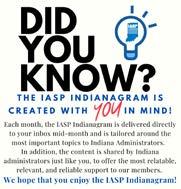
IASP Executive Committee
Dr. Crystal Murff Thorpe
President
Dr. Holly Arnold
President-Elect
Jennifer Matasovsky
Vice President
Matt Shockley
Past President
Amy Niemeier
NAESP State Representative

Dave Strouse
NASSP State Coordinator
Steve Baker
Liaison to the DOE
Dr. Daniel Peo
Assistant Principal Liaison
Return to Table of Contents
FROM THE EXECUTIVE DIRECTOR 4 www.iasp.org
UPCOMING EVENTS
IASP hosts events throughout the year to support the growth and development of Indiana school administrators and students. Each event is intentionally designed to encourage and engage all participants in the pursuit of learning!
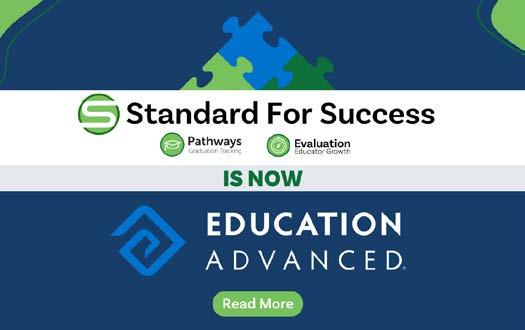
Find A Full List Of Events at www.iasp.org/Events
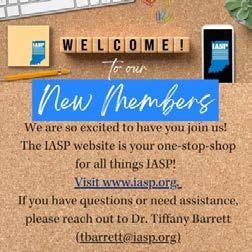
Return to Table of Contents
Special thanks to our Platinum Corporate Sponsor
5 www.iasp.org
Supporting College and Career Readiness
Dr. Katie Jenner Indiana Secretary of Education

In the four years we have students in high school, how might we maximize this time to make it as valuable as possible for our students? As I talk to stakeholders across the state, including many of you, one thing I have heard on repeat is that, “if” high school looked different for students, “then” we could better connect them to what’s next. The reality is, the structure of the American high school experience has not changed for most students in over a century. We know that while some aspects of the current high school experience work, many others are long outdated. The positive is… now is our moment and opportunity to make it better. It is more important than ever that we prepare our students with the foundational knowledge and skills needed to be successful in today’s careers and the careers of the future…and your voice and influence is a key part of setting our state, and ultimately our students, up for success.
At a very high-level, to accomplish this, we must work together to maximize the four years we have our students in high school, which includes: Making high school diploma requirements more flexible and relevant to students, employers, and communities; Improving access to and the number of students completing high-quality workbased learning opportunities; and Increasing access to and the number of students completing high-value postsecondary credentials before high school graduation
An update on this ongoing work was provided during the September SBOE meeting and subsequent work session, which can be found here.
Recently, during the 2023 Educational Excellence Award Gala, we also had an opportunity to spotlight the great work happening locally to prepare students for success after high school graduation. We often talk about the obstacles we face, depending on where we live, but as you can see from the below, we have educators and schools all across the state…from the smallest towns to the biggest cities…all making it happen for students!
Perry Central Junior-Senior High, Victory College Prep Academy, and the McKenzie Center for Innovation and Technology each received the Excellence in Student Pathways award for prioritizing access to work-based learning and apprenticeship opportunities for our students.
Perry Central Junior-Senior High is excelling at opening doors for their students and maximizing opportunities to participate in high-quality work-based learning experiences, with over 75% of their 2023 graduation cohort completing a meaningful internship aligned to their future career goals!
Victory College Prep Academy is fueling innovation through their Firehawks Internship and Real-world Experience (FIRE) Program, an entirely locallyorchestrated partnership with over 40 participating employers. The FIRE program is increasing access to career exploration by removing barriers, like transportation, and providing students more than 80 hours of work-based learning over the school year!
McKenzie Center for Innovation and Technology puts college and career readiness at the forefront by not only building and operating studentled businesses, but also developing and implementing a middle school curriculum, supporting essential career exploration for every eighth grade student.

The biggest award of the night –Excellence in Next Level Educational Experiences and Opportunities – was a “people’s choice”-style award. This award recognizes an individual school or district going above and beyond to prepare its students for the future, with a focus on literacy, STEM, and college and career readiness. Live voting by the public began the morning of the gala and went right up to the live announcement that evening! The three finalists Linton-Stockton School Corporation, Purdue Polytechnic High School, and Batesville High School were each awarded $250,000…and our grand prize winner Batesville High School earned an additional $250,000 for their school, for a total of $500,000! Be sure to
check out the links above to learn more about each of these incredible schools!
As is echoed by our community and philanthropic partners, we must be innovative when it comes to expanding opportunities for Indiana students to earn credentials of value and to do so while in high school. During the gala, we also recognized four schools, Penn High School, Columbus North High School, 21st Century Charter School, and Signature School, with the Excellence in College Readiness award for helping students achieve these employer-valued credentials before graduating high school.
Penn High School continues to expand their Early College programming, with over 100 students in their 2023 cohort earning the Indiana College Core and 89 earning an associate degree. Columbus North High School has established partnerships with over 600 industry, business, and community partners, leading to industry certifications. They are also a key partner in strengthening our state’s educator pipeline by providing scholarship opportunities for current students who aspire to be a teacher!
21st Century Charter School continues to fuel innovation in the high school space (did you know one of their students earned a bachelor’s degree during high school?!) with nearly 30% of their 2023 cohort earning an associate degree or the Indiana College Core! Signature School is truly excelling in opening doors for students, helping students in the 2023 cohort secure more than $21 million in scholarship awards from postsecondary institutions, averaging $243,595 in financial support per student!
Congratulations to these and all of our gala awardees! And thank you to each of you for all that you do to prepare every student with the knowledge and skills… as well as the connections to college and career pathways that they need for long-term success. Let’s continue to work together to leverage this opportunity to rethink high school in Indiana, and ultimately, help every student to ignite their purpose and achieve lifelong success.
Return to Table of Contents
6 www.iasp.org
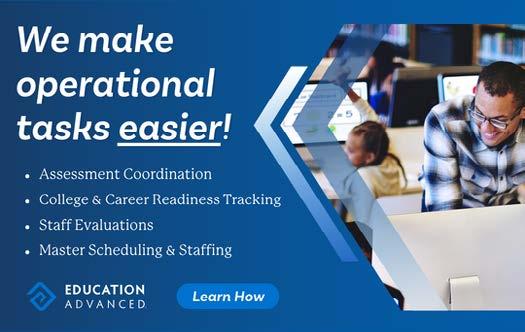





Return to Table of Contents
7 www.iasp.org
Special thanks to our University Partners:
From the AP Lens: Preparing Students for What’s Next
Dr. Dan Peo Assistant Principal Avon High School IASP Assistant Principal Liaison
Aaron D. Huff Principal
Benjamin Bosse High School NASSP President

As Assistant Principals and Deans, we are often assigned to four things during the school day; my friend and author Dr. Ryan Donlan uses the acronym S.O.D.A. = Safety, Order, Discipline, and Attendance. While these are key functions that must be in place for a school to operate, there are so many other functions that school leaders must learn about as they grow in their leadership. This month’s Indianagram theme relates to supporting college and career readiness and while it is a focus for those of us at the high school level, it is helpful for educators of all students to know and be somewhat familiar with the opportunities in store for students once they finish their Kindergarten to 12th grade journeys. This month, I’m so grateful to Mr. Aaron Huff, Principal at Benjamin Bosse High School in Evansville and current National Association of Secondary School Principals (NASSP) President, for sharing some important insights he has gained in his time as a high school principal.

Preparing Students for College and Careers
In an ever-changing and competitive world, the importance of preparing high school students for college and successful careers cannot be overstated. As the demands of the job market continue to evolve, more than traditional classroom education is needed to adequately equip students with the essential skills and competencies for their future pursuits. Realworld learning experiences, such as internships, job shadowing, service-learning projects, and industry partnerships, offer an invaluable opportunity to bridge the gap between school and the workplace. This article highlights the significance of realworld learning experiences in supporting high school students college and career readiness. We will discuss the benefits and implementation strategies/challenges and provide potential recommendations for educators and policymakers.
Understanding Real-World Learning Experiences
Real-world learning experiences refer to any educational activity that connects students with authentic and practical situations outside the classroom, allowing them to apply academic knowledge in real-life contexts. These experiences can take various forms, including internships with local businesses, service-learning projects in the community, job shadowing with professionals, and collaborations with industry partners. Such opportunities provide students with handson learning, foster skills development, and offer exposure to
potential career paths, all contributing to their college and career readiness.
Benefits of Real-World Learning Experiences:
■ Skill Development: Real-world learning experiences nurture critical skills such as problem-solving, critical thinking, communication, collaboration, and adaptability. These skills are highly sought after by colleges and employers, as they enable students to excel in academic settings and thrive in the workforce.
■ Career Exploration and Clarification: By engaging in realworld experiences, high school students gain insight into various professions and industries, helping them make informed decisions about their future career paths. Such exposure can lead to increased motivation and a sense of purpose.
■ Building Professional Networks: Real-world learning experiences allow students to connect with professionals, mentors, and peers. Building these networks can lead to mentorship, internships, and even job opportunities in the future.
■ Enhancing motivation and engagement: When students see the relevance and impact of their studies in reallife situations, their motivation and engagement in learning significantly improve, leading to better academic performance, stronger attendance, and a deeper commitment to their education.
To implement real-world learning experiences, high schools can pursue collaborations with local businesses and organizations to create internship and job shadowing opportunities. These partnerships can also involve guest speakers and workshops, exposing students to various career options and industry demands.
High schools—and even middle schools—can also encourage students to participate in service-learning projects, enabling students to apply their knowledge and skills to address real community needs. These experiences foster a sense of civic responsibility while promoting teamwork and developing leadership abilities. Additionally, schools can integrate experiential learning into the curriculum so that students engage in project-based assignments, explore case studies, and participate in simulations that mirror real-life scenarios.
Addressing Challenges and Ensuring Equity
It is essential to ensure that all students have equitable access to real-world learning experiences. Schools and policymakers must work to eliminate barriers such as transportation,
Return to Table of Contents
ASSISTANT PRINCIPAL CONNECTION
8 www.iasp.org
financial constraints, and systemic inequities that may prevent certain students from participating.
Ensuring academic rigor is also of the utmost importance. While real-world experiences are valuable, they must academically prepare students for higher education. To that end, these opportunities should align with educational objectives and adequately prepare students for college and career success. Schools can accomplish these objectives by breaking down academic standards and matching them with appropriate career learning standards.
As a longtime educator with deep experience in helping to provide students with workplace learning opportunities, I recommend the following:
■ Provide professional development opportunities in career education. Educators should receive ongoing training and support to incorporate real-world learning experiences into their teaching methods effectively.
■ Encourage collaboration with industry and community partners. Policymakers should facilitate partnerships between schools and local businesses, community
Leveraging School Health Data

organizations, and universities to expand real-world learning opportunities. They should also promote current collaborations between high school and industry partners serving all students.
■ Ensure funding and resource allocation. Allocating sufficient resources and funding to support realworld learning experiences is critical for widespread implementation and sustainability.
By integrating real-world learning experiences into the curriculum and addressing challenges related to access, equity, and quality, educators and policymakers can significantly contribute to the college and career readiness of the next generation. Supporting students in this way is an investment in their future success and a prerequisite for a prosperous society.
Mr. Huff can be reached via email at aaron.huff@evsck12.com or huffa@nassp.org
Fundable
Return to Table of Contents
to
Academic Outcomes
make your existing student health data usable in the MTSS process
schools their Academic Health Score
schools their Academic Health Cliff Score
schools support with IDOE Health Reporting
and code existing student health data from the school nurse or school based health center
schools professional development on use of health data and health professionals in their existing MTSS processes
schools in leveraging Title funds to pay for school nurses
Improve
for Children We
Provide
Provide
Provide
Transcribe
Provide
Support
by Title, ESSER, SIG, and Part B
approved as an evidence based best practice
more at www.healthdataproject.org
email us info@healthdataproject.org
IDOE
Learn
or
ASSISTANT PRINCIPAL CONNECTION 9 www.iasp.org
Place-Based Education: Fostering Engagement, Community, & Connections
 Krista Hensley Coordinator Early College at CELL
Krista Hensley Coordinator Early College at CELL
Current hot topics for educators: college and career readiness; chronic absenteeism; teacher retention; mental health for students and educators; and of course, student engagement. The list is much longer as we all well know, so how do school leaders address all of these issues in our current educational climate? While we acknowledge how overwhelming it is to consider all of the possibilities, the team at CELL (Center of Excellence in Leadership of Learning) has been diligently working to find ways to help Indiana educators and leaders create programs to reach all students with our initiatives such as the Early College model, PCAP (an alternative early college model), and now, more meaningful professional development for teachers. Specifically, we have added professional development to introduce Place-Based Education.
In September of 2022, I became involved in a Place-Based Education initiative, five years after retiring from 31 years in the classroom, and I view PBE as a process that addresses many of the topics mentioned above. What I learned is that projects designed to engage students and their teachers with their communities can bring about life-changing learning experiences. The projects give students a stronger sense of community, a sense of place, which in turn, give them an opportunity to feel a sense of belonging, making them want to be a part of something bigger than themselves.
So what is PBE? PBE “engages students in their community, including their physical environment, local culture, history, or people. With place-based learning, students get to see the results of their work in their community. They build communication and inquiry skills, learn how to interact with any environment, and gain a better understanding of themselves, as well as their place in the world” (Edutopia 2016).
The work started when CELL became a regional hub partner for the Rural Schools Collaborative and the Teton Science Schools with our federal EIR grant. Often in education, the best ideas come to fruition when dedicated professionals hone in on the specifics that make an idea worthy of implementation. For instance, we know that teachers have been doing projects that included outdoor space and communities. So what if more teachers could be given those opportunities, finding value in PBE, and as result, find a renewed sense of joy for teaching? What if a lesson plan involves collaboration, community, engagement, connections, storytelling, and communication all while meeting the
standards? Would it be a highly effective lesson? Of course it would, and that is what Place-Based Education can bring to the classroom, in an outside-the-four-walls location as well.
After introducing PBE to our rural educators in September 2022 through this grant, we had 16 schools participate in our inaugural year, and from those 16 schools, well over 1000 students were engaged in this authentic learning through multiple disciplines. While some of the projects are still ongoing, we also know that the direct impact of these projects has been immeasurable.
“Real World, Real Experiences, Real Connections.” This is one message we received when we asked our rural teachers to share why their Place-Based Education projects should be considered an example of “real” education. Another teacher shared this: “It connects them to their communities and the “real people” that live by them. There are real problems and real projects and real tasks to be completed outside of the four walls of the school.” As we continue to look for ways to engage our students, we hope that more teachers will learn about the positive impact that PBE has on our students and their communities.
The projects can take place in any discipline and any level of student, which makes it ideal for our Early College and PCAP students. It can involve one class or several. It can be cross curricular. It can be as simple as planting a community garden to creating a new website to increase tourism in your community. Or it can even be building a local nonprofit coffee shop, which is currently happening in West Lebanon, Indiana. PBE goes beyond PBL in that it connects the students to their community, creating a sense of place for the students.
Fourteen of our sixteen RECN schools created PBE projects with their communities: Bedford North Lawrence, Delta, Franklin County, Greensburg, Lincoln (Vincennes), Logansport, Northridge, Park Heritage, Perry Central, Rising Sun, Seeger Memorial, Sheridan, Shoals, and Winchester. Bravo to the teachers, their students, and the administrators who supported the projects along the way. As one other teacher concluded: PBE is real because “it shows students how what they’re learning can be applied to the world outside of the classroom.”
So would PBE make a positive impact on your school, your community? We know that some communities, especially rural and urban communities, are in need of reinvention to
Return to Table of Contents
SUPPORTING COLLEGE AND CAREER READINESS 10 www.iasp.org
help students feel connected to their schools and to their histories, and we know that we have a teacher shortage, especially in our rural communities. So bringing together ideas that will improve the wellbeing of students, and teachers, and communities, why would we not? Additionally, when teachers are given the freedom to step away from the traditional way of thinking about standards and are supported by the administration, the possibilities are endless.
As we continue to examine the benefits of PBE, here are a few skills that are utilized: collaboration, creativity, communication, problem solving, constructing, building, storytelling, and listening. Smith also [argues] “that schools capable of helping children acquire the skills and dispositions needed to create a more sustainable society must help lead them to:
(1) understand the primacy of the communities in which individuals are embedded,
(2) gain the skills and willingness needed to become effective local decision makers,
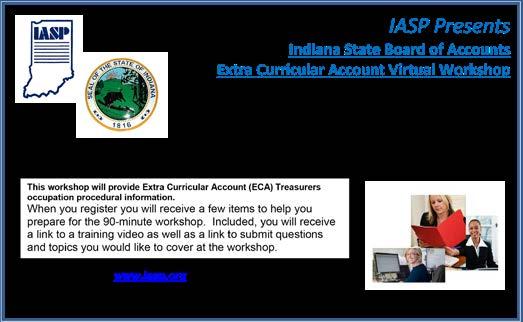
(3) grasp humanity’s fundamental dependence on the health of natural systems,
(4) move beyond a value system predicated on material comfort to one based on the importance of relationships.” (Smart).
In one chapter of Urban Environmental Education Review, the writers address the importance of place. “Making students more consciously aware of their taken-for-granted places is an important aspect of influencing their sense of place. Focusing on places students frequent, educators can ask questions like: ‘What kind of place is this? What does this place mean to you? What does this place enable you to do’” (Nature of Cities).
So how do we best address the issues that our rural and urban students experience? How do we help them become engaged in their academics and their communities in an authentic manner? We give the teachers an opportunity to be involved in PBE projects as part of their standards, allowing them to move outside the classroom to do just that.
To learn more about CELL’s work with PBE, please contact Jeremy Eltz or Krista Hensley at CELL.
■ Learn more about our relationship with the Rural Schools Collaborative
■ Learn more about A Critical Pedagogy of Place
■ Learn more about the importance of Place
Return to Table of Contents
SUPPORTING COLLEGE AND CAREER READINESS
11 www.iasp.org

Return to Table of Contents 12 www.iasp.org
THE 7 HABITS OBJECTIVES
HABIT PARTICIPANTS WILL:
HABIT 1: BE PROACTIVE®
HABIT 2: BEGIN WITH THE END IN MIND®
HABIT 3: PUT FIRST THINGS FIRST®
HABIT 4: THINK WIN-WIN®
HABIT 5: SEEK FIRST TO UNDERSTAND THEN TO BE UNDERSTOOD®
HABIT 6: SYNERGIZE®
HABIT 7: SHARPEN THE SAW®
THE 7 HABITS PROCESS
• Focus and act on what they can control and influence, instead of what you can’t.
• Define clear measures of success and a plan to achieve them.
• Prioritize and achieve their most important goals, instead of constantly reacting to urgencies.
• Collaborate more effectively by building high-trust relationships.
• Influence others by developing a deep understanding of their needs and perspectives.
• Develop innovative solutions that leverage diversity and satisfy all key stakeholders.

• Increase motivation, energy, and work/life balance by making time for renewing activities.

The 7 Habits of Highly Effective People Signature Edition 4.0 helps participants not only learn, but use processes and tools to live and apply the 7 Habits.

•
PARTICIPANT KIT
• Participant Guide
• New 7x7 Contract
• Habit Cards
• Practice Cards
• Skill Cards
• Weekly Big Rocks Cards
• Living the 7 Habits App
For more information about FranklinCovey’s The 7 Habits of Highly Effective People Signature Edition 4.0, contact your client partner or call 1-888-705-1776.
© Franklin Covey Co. All rights reserved.
Return to Table of Contents
PREPARE LEARN & PRACTICE LIVE
7 Habits® Assessment • 7 Habits® Work Session
Complete the 7 x 7 ContractTM
•
•
Use the Living the 7 Habits® App and 7 Habits Cards
13 www.iasp.org
Collaborative leadership: Promoting career- and college-readiness through school counselorteacher-principal collaboration
Rachel Louise Geesa Associate Clinical Professor Dept. of Ed Leadership, Ball State University
 Derien Kunce Graduate Student Clinical Mental Health Counseling, Ball State University
Derien Kunce Graduate Student Clinical Mental Health Counseling, Ball State University

To provide best practices to PK-12 students to be successful global citizens and lifelong learners, educational leaders (e.g., principals, school counselors, teachers, etc.) should explore ways to guide students in their academic-, career-, college-, and life-readiness development throughout the PK-12 educational pathway. School principals, school counselors, teachers, staff, and school-community stakeholders can collaborate to support and mentor students to be better prepared for successful employment opportunities in the future.
Indiana Employability Skills Benchmarks
According to the Indiana Department of Workforce Development (2023), Indiana employers identified 18 essential skills for employees within Indiana to be successful. These skills are organized into four categories, which include:
■ Mindsets (Skills: Lifelong learning and self-confidence);
■ Learning strategies (Skills: Aptitude and awareness, attention to detail, decision-making, effective communication, initiative, and problem-solving);
■ Social and emotional skills (Skills: Collaboration, connection, and regulation); and
■ Work ethic (Skills: Adaptability, independence, integrity, perseverance, professionalism, self-discipline, and time management and organization) (Indiana Department of Workforce Development, 2023, para. 2).
These essential skills can help educational leaders identify and implement best practices in schools to support workforce development for PK-12 students. Additionally, many of the employability skills align with educational and professional skills and standards for students and staff (e.g., collaboration, effective communication, problem-solving, etc.).
Demonstration of Indiana Employability Skills
According to the Indiana State Board of Education (2018), graduation pathway options for students to learn and demonstrate employability skills include:
■ “Project-based learning allows students to gain knowledge and skills by working for an extended period of time to investigate and respond to an authentic, engaging and complex question, problem, or challenge”
(Indiana State Board of Education, 2018, p. 3);
■ “Service-based learning integrates meaningful service to enrich and apply academic knowledge, teach civic and personal responsibility (and other employability skills), and strengthen communities” (Indiana State Board of Education, 2018, p. 3); and
■ “Work-based learning is a strategy to reinforce academic, technical, and social skills learned in the classroom through collaborative activities with employer partners” (Indiana State Board of Education, 2018, p. 3).
These learning opportunities provide students with real-world experiences in a variety of disciplines that may promote positive school-community partnerships for school leaders to develop and foster.
Tips for School Counselor-TeacherPrincipal Collaboration School counselors, teachers, and principals can explore ways to collaborate in PK-12 schools to effectively meet the academic-, career-, college-, and life-readiness needs of students. Additionally, collaboration has been identified by the Indiana Department of Workforce Development (2023) as an essential skill for success in employment. School counselors, teachers, and principals may consider the following tips for developing effective collaboration within their schools to better support all students.
■ Develop familiarity with one another’s roles and responsibilities to avoid misconceptions and to effectively utilize the expertise of colleagues while working to address students’ needs (DeSimone & Roberts, 2016; Lowery et al., 2018).
■ Foster open communication to identify priorities, goals, and responsibilities; and to share in decision-making. Communication can be increased through regular meetings (Edwards et al., 2014). Effective communication is also encompassed within the Indiana Employability Skills Benchmarks (Indiana Department of Workforce Development, 2023).
■ Establish trust and respect with
Return to
Table of Contents
SUPPORTING COLLEGE AND CAREER READINESS
14 www.iasp.org
colleagues to encourage ideasharing (Edwards et al., 2014). The establishment of trust and respect with students can also positively impact PK-12 students’ academic and socio-emotional outcomes (Pesch & Koenig, 2023), relating to the social and emotional employment skills outlined by the Indiana Department of Workforce Development (2023).
■ Pomote a positive school climate by supporting and advocating for colleagues and students around shared goals. A positive school climate benefits both students and stakeholders, and can increase students’ academic success (Edwards et al., 2014; Rock et al., 2017; Yildiz, 2021). School counselors’, teachers’, and principals’ focus on advocacy within a school may facilitate greater opportunities for students to engage in project- or service-based learning (Indiana State Board of Education, 2018) by placing students’ employability needs at the forefront of their educational experience.
Conclusion
School leaders can guide school stakeholders to develop and foster positive learning environments and opportunities for all students. Through school-community partnerships and school counselor-teacher-principal collaborative relationships, more project-, service-, and work-based educational experiences for students may become available for students to prepare for careers and higher education in the future.
References
Desimone, J., & Roberts, L. (2016). Fostering collaboration between preservice educational leadership and school counseling graduate candidates. The Journal of Counselor Preparation and Supervision, 8(2), 1-18. http://doi. org/10.7729/82.1081
Edwards, L., Grace, R., & King, G. (2014). Importance of an effective principal-counselor relationship. Alabama Journal of Educational Leadership, 1, 34–42.
Indiana Department of Workforce Development. (2023). Employability skills https://www.in.gov/ dwd/career-training-adult-ed/employabilityskills/
Indiana State Board of Education. (2018). Graduation pathways panel https://www.in.gov/ doe/files/graduation-requirements.pdf
Lowery, K., Quick, M., Boyland, L., Geesa R. L., & Mayes, R. D. (2018). “It wasn’t mentioned and should have been”: Principals’ preparation to support comprehensive school counseling. Journal of Organizational and Educational Leadership, 3(2), 2.
Pesch, A. & Koenig, M. A. (2023). Trust matters: Measuring and identifying a role for epistemic and interpersonal trust in preschoolers’ learning from teachers. Early Education and Development, 34(1), 27-52. https://doi.org/10.1080/10409289.20 21.1991729
Rock, W. D., Remley, T. P., & Range, L. M. (2017). Principal-counselor collaboration and school climate. NASSP Bulletin, 101(1), 23–35. https://doi. org/10.1177/0192636517698037
Yildiz, N. G. (2021). Collaborative leadership in the school community: School counselors and principals join forces for linguistically diverse students. International Journal on Lifelong Education and Leadership, 7(2), 27-36. https://doi. org/10.25233/ijlel.909564
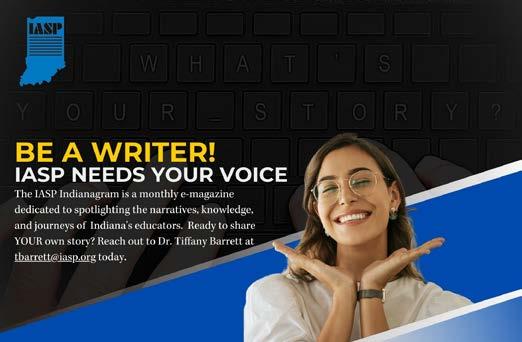
Return to Table of Contents
SUPPORTING COLLEGE AND CAREER READINESS 15 www.iasp.org
Empowering Indiana’s Future: The Vital Role of School Counselors in College and Career Readiness
Dr. Sherri Barrow Assistant Teaching Professor Ball State University, Dept. of Educational Psychology (School Counseling)
In the ever-evolving landscape of education, the role of school counselors has evolved significantly over the years. Today, these dedicated professionals play a pivotal role in ensuring that students are academically prepared and equipped with the necessary skills, experience, and exposure to thrive in their post-secondary aspirations of enrollment, enlistment, or employment. In Indiana, the importance of College and Career Readiness (CCR) has gained significant traction, and the state’s school counselors have emerged as leaders in this endeavor.
Counselors as CCR Champions
School counselors are uniquely positioned to champion the cause of CCR. They are equipped with the expertise and training to guide students through the complexities of college applications, financial aid, and career exploration. Counselors serve as mentors, advocates, collaborators, and consultants for students, helping them overcome challenges and build resilience, thus creating equitable access for all students.
Supporting Holistic Development
In Indiana, school principals and administrators recognize the importance of providing counselors with the tools and resources to support students’ holistic development. This includes fostering collaboration between counselors, teachers, administrators, the community, stakeholders, and parents to create an integrated student support system. Through collaboration, educators can identify individual student needs and tailor interventions to address them effectively.
Navigating College Admissions
The college application process can be overwhelming for students and their families. Counselors are instrumental in demystifying this journey. They provide guidance on standardized testing, application deadlines, and scholarships, ensuring every student has a fair shot at pursuing higher education. They help students explore various post-secondary options, from traditional four-year colleges to vocational and technical
schools.
Fostering Career Exploration
Career readiness is a critical component of CCR, and counselors in Indiana are instrumental in facilitating this exploration. They organize career fairs, invite guest speakers, and provide access to resources that enable students to identify their interests and aptitudes. They help students make informed decisions about their future careers, leading them to success.
Emphasizing Social and Emotional Well-being

Students’ social and emotional wellbeing is critical when preparing them for college and careers. Counselors create a safe space for students to discuss their concerns, anxieties, and aspirations. They assist in strategies to manage stress and build resilience that equips students with essential life skills far beyond their academic journey.
Action steps:
■ Clear Vision and Communication: A clear vision, effectively communicated, forms the foundation of success, ensuring alignment throughout the educational community.
■ Promote Leadership and Advocacy: Encourage counselors to assume leadership roles, championing the importance of CCR and their pivotal roles.
■ Provide Ongoing Professional Development: Invest in continuous training for counselors to remain updated on CCR best practices.
■ Support Data-Driven DecisionMaking: Encourage counselors to use data for informed decision-making, optimizing program effectiveness.
■ Foster Collaboration: Promote a culture of collaboration among counselors, teachers, and administrators to enhance student support.
■ Ensure Manageable Caseloads: Maintain reasonable student-tocounselor ratios for personalized student support.
■ Prioritize Counselor Well-being: Implement programs supporting counselor well-being and self-care.
■ Engage Parents, Stakeholders, and the Community: Encourage counselors to involve parents, stakeholders, and the community in students’ educational and career journeys.
■ Regularly Assess and Provide Feedback: Continuously assess the effectiveness of the school counseling program and make necessary improvements.
■ Celebrate Successes: Recognize and celebrate counselor and student achievements, boosting morale and motivation.
In conclusion, school administrators in Indiana play a pivotal role in empowering school counselors as leaders, advocates, collaborators, and consultants for student success. By implementing these actionable steps and recognizing the multifaceted role of counselors, administrators can provide the necessary support and resources for school counselors to effectively implement a comprehensive school counseling model (see resources for recognition in Indiana below). A comprehensive school counseling program addresses students’ CCR needs and supports their academic and social-emotional well-being, ensuring they are well-prepared for a future filled with opportunities and success.
Resources:
■ Indiana Comprehensive School Counseling Model: Carry the Torch for Student Success (IDOE) tiered model of recognizing a comprehensive school counseling program.
■ ASCA 4th National Model Executive Summary
■ ASCA (2019) School Counselor
Professional Standards & Competencies
■ ASCA (2021) Student Standards: Mindsets & Behaviors for Student Success: K-12 College-, Career-, and Life-Readiness Standards for Every Student
■ ASCA (2022) Ethical Standards for School Counselors
References:
American School Counselor Association. (2019). ASCA national model: A framework for school counseling programs (4th ed.).
Return to Table of Contents
SUPPORTING COLLEGE AND CAREER READINESS
16 www.iasp.org
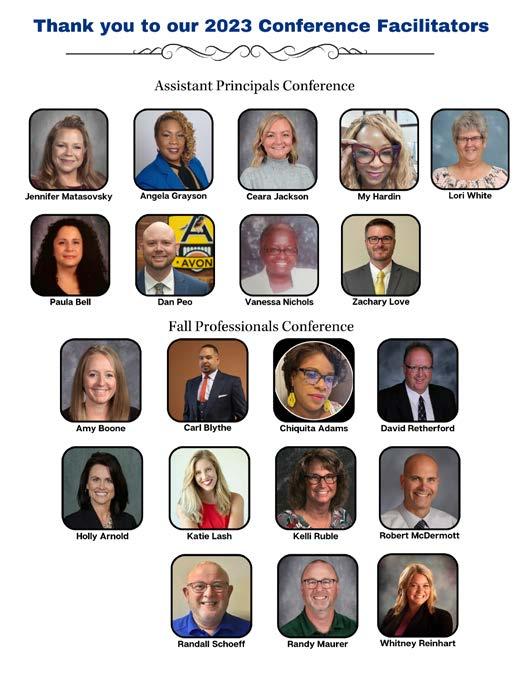
Return to Table of Contents 17 www.iasp.org

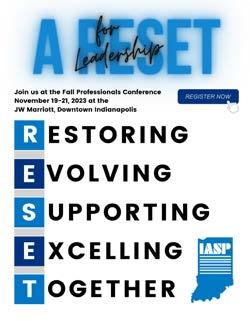
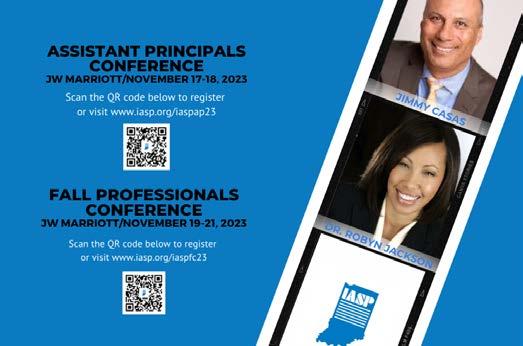
Return to Table of Contents 18 www.iasp.org

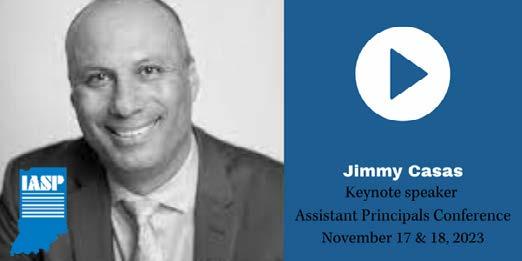
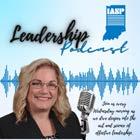



Return to Table of Contents Click here to check out the IASP Leadership Podcast with Aaron Huff! 19 www.iasp.org
IPLI Updates
Dr. Kelly Andrews Director Indiana Principal Leadership Institute
IPLI is a premier professional development opportunity for the practicing principals of Indiana. We support you, encourage you, and provide growth in your leadership as we learn together, lead together, and connect.
IPLI has launched another year of learning for Indiana principals across Indiana. We are grateful to the mentors who guide and support each principal on their learning journey to increase their leadership and school capacity. Thank you to the following mentors:
Cohort 11
Aimee Lunsford - Warsaw
*Amy Linkel – Switzerland County
Amber Walters - Avon
*Brent Bokhart - Crawfordsville
Brittany Greene – Spencer Owen
Chad Rodgers - Greencastle
Christy Merchant- Warren Township
Jaime Carroll – East Noble
Matt Deeds - Warsaw
Nathan Boyd – South Bend
*Leadership Team Members
Cohort 10
Adam McDaniel – New Castle
Brian Hagan – Mt. Vernon
Diamond Robinson – South Bend
Jennifer Griffin -Merrillville
John Pearl – West Lafayette
Leigh Barnes - Valparaiso
*Mike Pinto – West Lafayette
Shane Killinger – Brown County
*Tina Noe – Danville

The September Seminars for both cohorts will take place September 19 and 20 at the Lawrence Township Education and Career Center in Indianapolis. Featured speakers will be Dr. Phil Warrick on High-Reliability Schools Level 2 and Dr. Nate Regier on Personality and Leadership: Stewardship of Your Greatest Assets.
IPLI Extended Learning Opportunity #5 - Registration: http//indianapli.org/ipli-extended
This year, IPLI ELO #5 is being facilitated by Leadership Team members *Jane Rogers and *David Robertson. We are thrilled and excited to work with Dr. Rhonda Roos, former IPLI Leadership Team member and now a consultant who will lead this year.
IPLI Extended Learning Opportunity is a formal yet intensive professional development program for IPLI graduates beginning their 5th year. ELO allows IPLI Elite Graduates to dig deeper into topics covered during the IPLI experience. Three-day-long seminars will let you dig deeper into leadership topics that will support you throughout the year. Choose one or attend all three seminars…. whatever works in your busy schedule. However, you deserve a day of learning and connecting.
Themes vary yearly so that graduates can enroll in ELO multiple times. IPLI ELO participants are encouraged to bring teacherleaders to the seminars when appropriate. This year’s theme will be “Leaders in Action,” featuring the following speakers: Dr. Rhonda Roos and Dave Weber.
The Fall Seminar in September will be on the ISU campus, and we are planning a cohort reunion. You will not want to miss this opportunity to reconnect. We are calling all mentors, past and present, to participate with special pricing just for you! We hope to see you there.
IPLI celebrated ten years of serving principals at the 2023 Summer Seminar, including Cohorts 10, 11, and ELO#5. Keynoting this year was Dr. Peter DeWitt discussing Collective Leader Efficacy. Additionally, our principals heard from Dr. Todd Whitaker, Annette Breaux, Dr. Mario Acosta, and Kim Campbell. The learning, collaboration, and networking were an amazing launch to another decade of serving principals.
Over the last twelve months, having a statewide principal professional learning community to support Indiana’s school leaders as they have met the academic challenges has been invaluable. IPLI met the needs of Indiana principals by increasing mentor contacts, developing and sharing resources, and intensifying regional networks of support.
As Director of IPLI, I am excited for the future of schools in Indiana as the aligned system for principal professional development has never been more significant. INALI, IPLI, and IPLI Extended Learning Opportunity meet the need. IPLI is grateful for your ongoing support, trust, and dedication to education and educators during these challenging times showing Indiana’s commitment to growing our schools and students.
Return to Table of Contents LEADERSHIP DEVELOPMENT
20 www.iasp.org


Return to Table of Contents LEADERSHIP DEVELOPMENT 21 www.iasp.org
Riley Kids Caring & Sharing Update
Susan Miles Officer, Kids Caring & Sharing TM Riley Children’s Foundation

Kids Caring & SharingTM Preparing students for life
Children who develop empathy and move into action on behalf of others at an early age will likely become engaged and generously giving citizens. The philanthropic partnership between Riley Children’s Foundation and the Indiana Association of School Principals offers students simple ways to help other children by raising funds through their schools to benefit Riley Children’s Health.
KCS participant schools engage students in a variety of character and leadership development activities as they collaborate to raise funds supporting the state’s only nationally-ranked, comprehensive children’s research hospital. Last year Indiana K-12 schools raised an amazing $2.1 million to support families benefiting from Riley’s expert clinical care, impactful family support services and groundbreaking research initiatives.
Since the statewide philanthropy partnership program’s 1985 inception, students engaged in KCS and Riley Dance Marathon projects have had the opportunity to:

■ Develop brainstorming and critical thinking skills;
■ Practice time management while organizing projects;
■ Work in teams to execute a plan;
■ Improve social skills and gain confidence in public speaking;
■ Expand persuasive writing skills through event advertising and marketing;
■ Explore math concepts and develop money management skills; and
■ Discover the empowerment and joy found in helping others.
Is this a philanthropy program or a leadership development experience? Both! And what a fabulous opportunity for project-based learning programs to bring what might have been an extracurricular activity right into the classroom. All the elements are there – collaboration, employability, community partnership, publicly presented product, and great opportunities for feedback, revision and reflection.
A busy 2022-23 school year saw nearly 320 schools engaging in fundraising activities to support Riley kids and families. Eight school corporations celebrated every member school raising at least $1 per student. Yet there is still an opportunity to grow our Riley family of supporters. Twenty-three of Indiana’s 92 counties were not represented with at least one school participating in a KCS activity last year. Can your school community help us close the gap this school year? I’m here to help!
Donor gifts making things happen
Your gifts to Riley each year make a big impact. Please read more about an exciting new medication your support helped make possible. (And thank you from this mom of a Riley kid with Type I Diabetes!)
September is Pediatric Cancer Awareness Month

A wonderfully generous call to raise awareness about and funds for pediatric cancer research initiatives at Riley.
Great time to update your gift submission information. Please note and share with your school treasurer that KCS gifts now need to be directed to our safe lock box for processing and to facilitate timely recognition. Contact me if you need the foundation’s current W-9 to complete your records. Checks should be made payable to the Riley Children’s Foundation and mailed to: P.O. Box 3356 Indianapolis, IN 46206-3356
Thank you for your spirited and generous participation!

Special thanks to our Preferred Business Partner:


Return to Table of Contents
SERVICE
22 www.iasp.org
Brownsburg Community Schools hosted their annual Riley Week, August 21-25 led by their spirited high school Chain Link crew (Student Council). Friday night’s Red Out for Riley celebrated an amazing $27,193.74 raised for Riley kids!

Return to Table of Contents 23 www.iasp.org
KGR Law Briefing: New Indiana Laws related to Career Pathways

 Séamus Boyce Attorney
Séamus Boyce Attorney
Kroger Gardis & Regas, LLP
Keith Butler
Summer Intern
Education Law & Policy
Kroger Gardis & Regas, LLP
The 2023 Indiana Legislature passed a lengthy law, SEA 1002, that some described as an attempt to “reinvent high school.” The bill has several components that affect career pathways in Indiana schools. Important components include a requirement for a career fair during school hours, coordinating “thirtyminute meetings” between students and potential employers, and the creation of several career related grants. We anticipate questions on these issues and others will ramp up as the school year moves along. This article provides an overview and we welcome more questions from you via the KGR Legal Help Desk.
Career Fair
1002 creates a requirement for high schools to hold a career fair at least once per year during school hours. Specifically, 1002 states:
During each school year, a school that is a high school must hold, during regular school hours, at least one (1) career fair. A school may satisfy the requirement of this section by hosting or participating in a joint career fair involving at least one (1) other school if transportation to the joint career fair is provided to every student in grade 11 and grade 12.
IC 20-30-5.6-8. “Career fair” is defined as an event at which employers and labor organizations can meet with high school students to discuss future career opportunities. IC 20-30-5.6-1. It does not specify whether the entire career fair must start and end during school hours. Reinforced by communications with legislators, our belief is that if the fair begins during school hours it can
continue after the end of school. The most important policy consideration is that students doesn’t have to come back to school on nights and weekends.
Thirty Minute Meetings
The thirty-minute meetings are meant for students to discuss career opportunities and necessary education with an appropriate professional. Specifically:
[D]uring each school year, a student who is: (1) enrolled in a school; and (2) in grades 11 and 12; shall meet with at least one (1) approved postsecondary educational institution, intermediary, employer, or labor organization for not less than thirty (30) minutes to discuss current and future career opportunities and the necessary education levels for various careers.
IC 20-30-5.6-5(a). An “intermediary” is broadly defined as “an organization that connects individuals with companies looking for new workers.” IC 21-18-1-3.5. Prior to the meeting, the student should be given an opportunity to select which organization he or she wants to meet with.
The law does have some exceptions. A parent may opt the student out of the meeting. If the student is already receiving career navigation coaching, then the meeting is not required. Additionally, if the student is participating in a program approved by the school in which the student works for an employer or labor organization for part of the school day and attends school for part of regular school hours, the meeting requirement does not apply. If the school determines none of the approved organizations are willing to meet with the student, they can send a written request for a waiver to the Commission for Higher Education (CHE).
New Diploma Requirements
The State Board of Education in consultation with the Indiana Department of Education (IDOE) must establish new high school diploma
requirements. IC 20-19-2-21. They are to adopt new regulations by December 31, 2024.
Career Scholarship Accounts
The Career Scholarship Accounts (CSAs) probably have garnered the most attention. The program provides $5,000 annually to eligible students in grades 10 – 12 enrolled in programs to pursue apprenticeships, applied learning, work-based learning, and credentials attainment. IDOE approves eligible programs, CHE approves eligible providers, and the Indiana Treasurer’s office approves eligible student expenses. Funds have already been authorized for career coaching navigation services, postsecondary education/training, transportation and equipment, and certification/ credentialing examinations. There are fewer than 1000 CSA grants available this school year. The application window closes on October 1st.
IDOE has created guidance on CSA grants, what organizations are approved providers and how to become approved. See Guidance to Support New CSA Opportunity for Students. A list of approved programs is available through the CSA Provider Application. Those CSA grants that will get preference are: (1) Next Level Programs of Study; (2) Modern Youth Apprenticeships; and (3) the US Dept of Labor-Registered Apprenticeships Program. As funds are available, grants will also be provided for ICC and Level 2 or above WBL experiences. An application for becoming an approved provider is available on the CHE website here.
What is the legal lesson from this brief? There are important changes to the structure of career pathways Indiana. Blink and you might miss the opportunity to be involved on the front end.
We at the KGR Legal Help Desk are here to address legal issues for IASP members. Until the next KGR Law Briefing, stay legal!
Return to Table of Contents LEGAL REVIEW
24 www.iasp.org
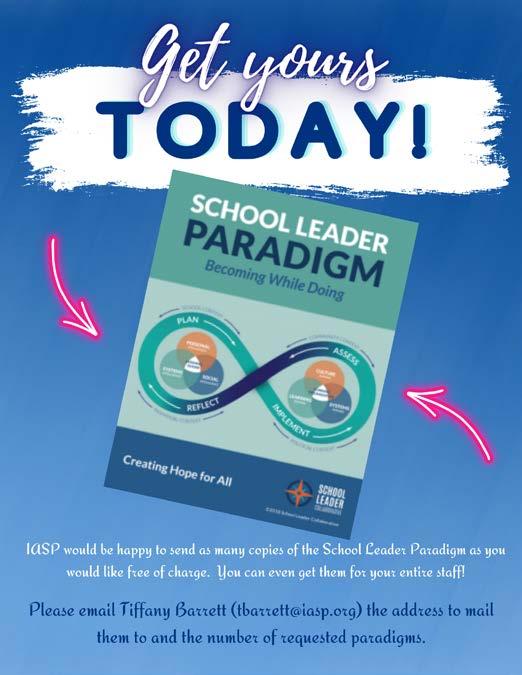
Return to Table of Contents 25 www.iasp.org
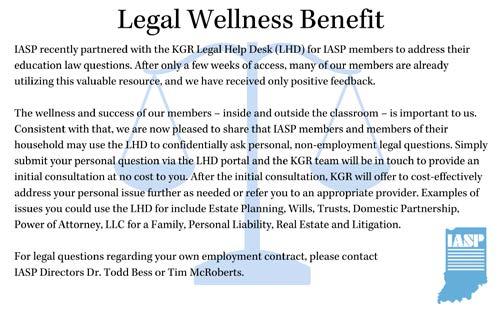

Return to Table of Contents 26 www.iasp.org
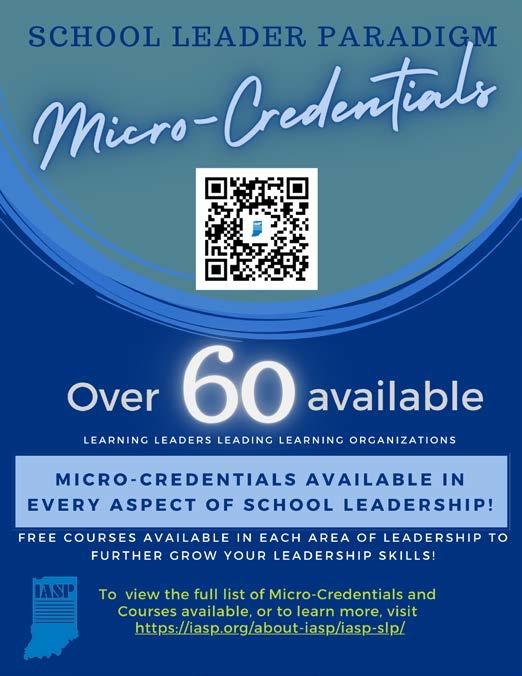
Return to Table of Contents 27 www.iasp.org



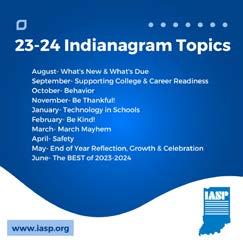

11025 East 25th Street Indianapolis, IN 46229 1-800-285-2188 or 317-891-9900 www.iasp.org | iasp-info@iasp.org Long-time corporate supporter, Horace Mann, can help you and your employees make sure you’re on the best path forward once payments resume. Contact your local Horace Mann representative to prepare now before payments resume. Student loan payments will resume Oct. 1, 2023 — are you ready? Click or scan the QR to contact your local Horace Mann representative! Horace Mann is an independent company not affiliated with the Department of Education or the federal government. Horace Mann Service Corporation and certain of its affiliates (Horace Mann) enter into agreements with educational associations where Horace Mann pays the association to familiarize association members with the Horace Mann brand, products or services. Contact association.relations@horacemann.com for more information. AM-C04745 (July 23)















































